- Home
- Dave Pelzer
The Privilege of Youth: A Teenager's Story Page 4
The Privilege of Youth: A Teenager's Story Read online
Page 4
Even though I was only a freshman in high school, at work the tall, muscular boys and the pretty girls from the upper grades accepted me as their own. Yet just like in junior high, whenever I saw anyone I knew from work at school, I’d instantly duck my head and stride past so not to embarrass them or myself in public. Once, one of the girls I worked with at the fast-food restaurant, who was the most breathtaking girl in the entire school, yelled over from the other side of the hallway. In an instant I tensed up thinking I would get ridiculed. To my surprise, and in front of her bleach-blond, Farrah Fawcett-like feathered-hair friends, who chewed their mouthfuls of gum like cows chewing cud, she sashayed over, then winked at me before bending over and kissing me on the cheek. My knees buckled. As she withdrew, the ends of her hair brushed against my forehead. With my eyes closed I caught a whiff of her Charlie perfume. Hordes of kids froze in their tracks as they hooted and howled. As the blood raced to my cheeks, my world stopped. As a no-name, skinny, pimple-faced, invisible freshman, it was an extraordinary, one-of-a-kind moment. Then she turned on her wooden clogs and sashayed away, disappearing among the crowd.
That singular fleeting episode elevated my esteem for the longest time. For the most part, I was terrified of high school. To me, high school was the major leagues. Everything seemed so intensified—the lessons in class, the monumental amount of homework, the pressure of who belonged to what social cliques—while all the time I tried to glide by from class to class while hugging the shadows. After my “hallway kiss,” I began to feel a little less fearful and intimidated, yet within days I moved again to a different home. I was crushed.
My newest foster parents, the Welshes, I thought were barely old enough to be parents themselves. In their mid-twenties and with three children of their own, the Welshes’ carefree attitude was completely different from the other more mature, stricter homes. When I was told of another sudden move, I assumed I did something wrong—that my grades at school suffered from my work and therefore I had to be placed into yet another home. But to my surprise, the Welshes and I were moving from our dreary duplex into a home on the edge of the county. I hated the constant moves—adjusting to one home, getting lost as I found my way around a new city on my bike to find a job, or getting to know the layout of the new school and all that went with it. No wonder I never fit in, I told myself. As much as I became used to my high school, my main concern was where and how soon I could find another job.
Days later, in October of 1976, on a warm Saturday afternoon, I rode inside the back of the U-Haul trailer for just under an hour, with the sole intention of somehow protecting John Welsh’s upright piano from rolling off in case the rope snapped. But it was only as John drove his ancient gold Chrysler on the bumpy freeway that I suddenly realized the only thing that kept John’s prized household goods from spilling onto the freeway, in case the rattling U-Haul doors flew open, was my skinny frame and the death grip I had on a piece of frayed nylon that kept the jostling doors closed from within.
When John’s car finally lurched to a stop, I flung open the doors before passing out from the car’s exhaust fumes. After stepping outside, as my head cleared I wiped the grit from my eyes, then scanned my new surroundings. For a moment I couldn’t believe it. Surely, I thought, Mr. Welsh had made a mistake. “We’re gonna live here?” I shouted to no one in particular. As I strolled into the middle of the street, I heard John’s confirmation. “Yep, this be the place.” The entire neighborhood was something straight out of the 1960s television show Leave It to Beaver.
Everything was perfect. The homes seemed to glisten as if they were just painted. The front yards’ grass were bright green and perfectly manicured. And every car seemed not only new, but shined as if just waxed. At one end of the street a tall, lanky boy shot basketball hoops, and at the other end of the block a small army of frenzied, well-dressed kids played in their front yard.
The only sounds besides the weeping willows’ rustling leaves and the high-pitched children’s laughter were muffled echoes of a hammer striking metal. I timidly stepped over to an open garage to sneak a better look. A man with taut muscles, black hair, and black-framed glasses was bent over and stopped when he must have sensed my presence. Too nervous to say anything, I shrugged my shoulders and simply stared. After a few seconds, the man straightened his posture, seemingly wondering what I wanted. With my mouth beginning to dry, I blurted, “So… whatcha doin’?”
Wiping the sweat from his creased forehead, the man replied, “Working.”
Fascinated by the man’s vintage orange Chevy truck parked in the driveway, I lingered. “I just, just moved in,” I stumbled, while pointing at the U-Haul trailer. “We’re gonna be neighbors,” I stupidly added, as if he hadn’t already figured this out.
The man replied with a thin smile. He waved his hammer as if to move me along, and he emphasized, “I’m busy, and you should be helping your father.”
Speaking faster than I could think, I corrected, “Oh… he’s not my dad. We’re not relat—”
After raising an eyebrow at me, the mechanic gave me a quick glance up and down. Then without a word, he again waved his hammer, telling me to move on before returning to his task.
For most of my childhood, and the last two years while in foster care, I had seen that look a million times before. Strolling across the street, I told myself not only what a spaz I was, but what a jerk the man in the garage was. I found out some time later that I had just met Dan Brazell.
Later that night as I lay on the top bunk with my hands clasped behind my head and the window cracked open, I listened to the wind run through the weeping willows. With a slight inhale, I absorbed the fragrance from the nearby jasmine. There were no sounds of police or fire sirens racing up and down Main Street. I didn’t live in a run-down neighborhood, with broken rusted-out cars resting on cinder blocks. I didn’t have to endure another night of listening to some couple yelling from the other side of the duplex, or pulsating music that reverberated from three houses away. As I closed my eyes, I felt a quiet sense of calmness.
The next Monday, in the afternoon, my mundane life took a drastic turn when two boys about my age, who had watched me unload the Welshes’ belongings the entire weekend, strolled over to introduce themselves. Having glanced at them both on and off during the last two days, I didn’t feel threatened or intimidated in any way. The taller of the two, Dave Howard, had wide eyes that seemed to drip with enthusiasm, with a matching grin as if craving for something to happen. Paul Brazell, slightly shorter than me, had intense eyes, as if he were constantly contemplating several things at once.
With an inquisitive gaze Paul jumped in with a query, “My dad says those folks aren’t your parents. So… what’s the deal?”
I immediately knew where this was heading. Once they confirmed what I felt they already knew, Paul would then distract me with a few choice sentences, while David would move in for the kill.
“I’m, uh… a… foster kid,” I mumbled.
Rearing his head back, David roared, “A foster kid?…” Stepping back, I plotted where to flee before Howard might raise his fist. Looking down at me, David gave me a leering smirk. As if pausing for effect, he finally blurted, “Cool, man. So, what’s it like not to have to live with your parents? You must get away with a lot, eh?”
I breathed a sigh of relief that I wasn’t about to be ridiculed, but before I had a chance to smile, Paul huffed, “I wouldn’t mind not living with mine.”
Eager to get to know them, I asked, “So, what’s it like to live here?”
Both Paul and David didn’t seem to share my excitement. While Paul continued to study me, David shrugged his shoulders. “It’s no big deal.”
Stunned in disbelief, I fired back, “No way! I mean, look at this place—the trees, the homes—it’s so Stepford. I’ve never, and I mean never, seen anything like this before.” I knew I was becoming overly emotional about something that seemed so mundane, but I persisted. “So… what’s it like to live
here?”
For a few moments the three of us shuffled our feet in silence. With a slight twinkle in his eye, David Howard smiled at me. David and I seemed to feel the same sense of appreciation. After a few moments of awkward silence Paul turned to point toward his front yard, explaining how his father, Dan, through his own sweat and ingenuity over the years, had turned it into the pride of the neighborhood; including resurfacing the grass, the brick walkway, and brick fencing. The more the three of us carried on the conversation, the more I realized I was part of something. I wasn’t the outsider who never fit in, who got tormented or beat up simply because I was different. As the sun’s rays seemed to fade, from deep inside, for the life of me, I couldn’t stop smiling. In a seemingly ordinary everyday moment, I raised my hand to shield my face, but it wasn’t from fear or an act of defense, but to help keep my eyes from squinting from the setting sun. I didn’t want to lose a second of being with David and Paul.
“So,” Paul inquired, “at the other places you lived at, what did you do… for fun? What’d ya do?”
I shrugged before answering, “Well, after coming home from high school I’d go to work. On the weekends I put in a full-time shift, then maybe once in a while I’d go to the movies.”
David’s eyes grew wide. “You work full time?”
I nodded my head. “Yeah, it’s no big deal. I’ve been doing it for a…”
“Man,” Howard grinned. “You must be rich. What ya gonna do, buy a car? That would be bitchin’.”
“Nope.” I brushed it off. “I, uh, just save money; you know, unless I buy clothes or something.” As I answered I realized I had never given much thought to buying a car. For years my mind-set had been driven by pure survival.
“You get to buy your own clothes?” Howard asked.
“My mom still takes me shopping. It’s such a drag. I hate it when she checks the waist by pulling up on the pants in front of everybody.” Paul rolled his eyes.
“That’s ’cause you’re so cute,” Howard teased. “So, Pelz, do you have a driver’s license or a permit? ’Cause if you had a car, we could cruise El Camino Real, pick up chicks, and get lucky,” David drooled.
“No!” Paul shouted. “He doesn’t have a license; if he did, he wouldn’t be talking to us. Duh!” Turning toward me, Paul stated, “You have to forgive Howie; he’s been dropped on the head one too many times.”
Contorting his face, David imitated, “That’s right, George. Dropped on the head, I was, ’cause I likes to tend da rabbits. Gonna tend da rabbits. That’s what I’m gonna do, get a place of my own and tend da rabbits.”
“Man!” I exclaimed, “That’s my all-time favorite book!”
“A book?” Howard asked. “I got it from a cartoon.”
“Yo, Deputy Dawg,” Paul interrupted, “it’s a book. Of Mice and Men. You know, a couple of guys working all over, trying to scrape up enough so they can have a place of their own.”
Acting as if he didn’t understand, Howard remained still. “Yeah,” I agreed. “These two guys who don’t fit in, they work at this camp with other men who band together to share their dream, so they can live and no one can bother them. You see, all they wanted was to have their own home. A band of brothers in their own home…” My voice trailed off.
Howard again smiled. I shook my head, discovering that he knew all along about the story he had probably read in junior high, like I had a few years ago. “We could be a band of brothers.”
“I’d be Lenny,” Paul announced.
Imitating the voice I did in drama class, I said, “An, an I be, be George.”
“What about me?” David whined. “What’s my character?”
“You’d be the rabbit,” Paul stated while smiling at me for encouragement.
“Definitely,” I seconded. “You’d be the rabbit.”
Giving Howard a deviant look, Paul rationalized, “In case you pissed us off, I could whack you on the head, and cook you for stew.”
The three of us bantered back and forth, teasing one another about who’d be who in our little game. We rambled back and forth across the street until Paul’s mother shouted it was time for dinner. After teasing Paul as he left that he would be the ill-fated rabbit, David and I stood facing the sun’s last rays until he, too, was called home for dinner. Feeling vulnerable and suddenly alone as David raced down the block toward home, I shouted, “See, ya! See ya tomorrow!”
Howard stopped, ran back, and patted my shoulder. “Lenny eat fast for George, so we can tend da rabbits.” Then dropping the act, David leaned close to say, “I’ll be back in a few. I’ll see ya right after dinner. Then we’ll have some fun. Trust me, you are so gonna love living here.”
4. The Neighborhood Threat
Within days of moving into Duinsmoore Way, the once serene neighborhood transformed into a playground of reckless abandon. As a pencil-thin, four-eyed, pimple-infested, shaggy-haired teen with no esteem, I had become the epitome of terror. And it all started with the minibikes.
When John Welsh drove up with the final load of belongings containing my rusted minibike, Paul and David rushed over to ogle at my prize. After years of hoarding every dollar I could—that wasn’t spent on bell-bottom jeans or a psychedelic rayon shirt, or whenever I’d splurge on a movie or ABBA’s latest record—one day on a whim I had purchased a motorized minibike for the paltry sum of $35.00. As Paul and David stood gawking at the bike, they acted like they’d never seen one before. To me it wasn’t all that much to look at. The threads on both tires were practically bare, the single horsepower Briggs & Stratton lawn mower engine was louder than a jet engine, and it accelerated as fast as a turtle crawling uphill against the wind. My vehicle had no brakes and slowed only when I mashed the heels of my worn Adidas tennis shoes to the pavement. On the plus side, the faded red, tubular frame acted as a sponge to either absorb or hide the rust, the grayish-black exhaust, and the dark sticky oil that oozed from every seal of every gasket.
And yet the bike was my baby. “Pretty cool, ay?” I pointed as Paul knelt down for a closer look. His eyes inspecting every part, Paul simply nodded. After a few moments Paul stepped away allowing David, who was smiling from ear to ear, his turn to examine the bike.
“So, how fast does it go?” David asked.
With my hands folded against my chest I smiled. “Thirty… maybe forty miles per hour,” I smugly lied.
“No way, dude!” Howard shot back.
“Oh yeah,” I justified, “this baby rips.” This was way too easy, I thought to myself. I knew I had David totally suckered until I heard the distinctive rumbling echo from behind me. Spinning around, my cool facade instantly dissolved when I discovered Paul sitting triumphantly on a gleaming metallic-sliver and blue-green minibike.
From behind, David punched me in the shoulder as he leaned over and stated, “Pretty cool, ay?”
After Paul informed me how his father had built the bike for him as a Christmas present, all I could do was marvel while he rattled off in meticulous detail the bike’s features, ranging from the rear drum brake system, the smooth-idling, two-and-a-half horsepower motor, down to the slick black grip handles.
David couldn’t resist. “Hey, Paul. Pelz says his bike can go thirty, even forty miles per hour. You two oughta race!” Howard’s words were the neighborhood’s undoing. Within minutes Paul and I were revving our minibikes up and down the street. Then again, and again and again, until both of us ran out of gas. By an embarrassing margin, Paul always won. In the days to follow, the races continued with the same results: Paul with his superior machine would always spring ahead, while I pumped my feet like Fred Flintstone propelling his prehistoric car. The most my dilapidated minibike could do was cough before belching a cloud of dark smoke, then begin putting its way after Paul, who, by that time, was so far ahead it was degrading to even try.
In the weeks to follow I became obsessed, but surprisingly it was not with my usual self-induced paranoid state of finding more jobs—so that I could exhau
st every inch of myself day after day, stashing away a few bucks from a measly paycheck so I wouldn’t starve in the future. This constant pressure was becoming too much. As proud as I was of being a young teen working in an adult world, I didn’t know how long I could keep up the frantic, almost suicidal pace. And yet, it was all so normal for me: Get up, go to school, do homework between classes, at lunch, in the bathroom stall, wherever. Blitz home, change clothes, run off to work. Tuesdays, Thursdays, and every other Friday and Saturday I’d be a busboy at the Sizzler restaurant, but on Mondays and Wednesdays I’d work at the fast-food joint on the other side of town, while other days I’d fill in at the plastics factory during the swing shift and would shine shoes in between. Pedal the bike, lean into the wind, can’t be late. Work hard, work fast, don’t stop, don’t quit, don’t think, just do. Go, go, go, go!
And at least when I worked, I felt less guilty, less dirty about my former life or the fact that my brothers were still under the rule of my disturbed mother. My sweat, my labor, was penitence for me. But every afternoon I spent with David and Paul goofing off, babbling away about nothing for hours, meant $10 a day less for me to hoard. Part of me could not believe that I would even contemplate the idea of not constantly pushing myself to extremes on a daily basis. But yearning to be with my friends was a sensation so strong that it was beyond anything else I had ever experienced.
With the garage door wide open and the evening breeze seeping in as I tinkered with my minibike, I willingly brushed aside my guilt. I began to focus my attention on my new obsession: beating Paul. Even after I rinsed out my lime-green spongelike air filter, tightened my loose chain that rattled from the rear wheel’s sprocket, adjusted the carburetor idle to full open, then gave the bike a bath in gasoline to remove the crud and baked-on oil splotches, as if to somehow make my motorized relic more aerodynamic, I knew my chances were still nil. The math was obvious: Paul had an engine that didn’t constantly sputter, had more horsepower, and brakes that allowed him to go faster for longer distances… and he weighed far less than me.

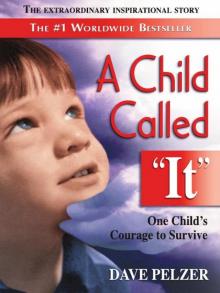 A Child Called It: One Child's Courage to Survive
A Child Called It: One Child's Courage to Survive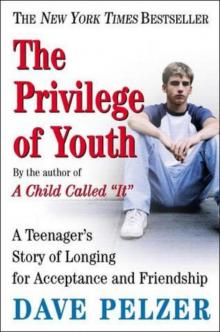 The Privilege of Youth: A Teenager's Story
The Privilege of Youth: A Teenager's Story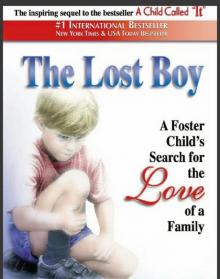 The Lost Boy: A Foster Child's Search for the Love of a Family
The Lost Boy: A Foster Child's Search for the Love of a Family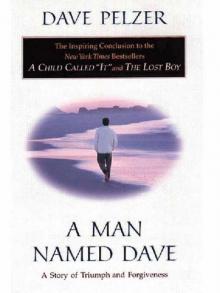 A Man Named Dave
A Man Named Dave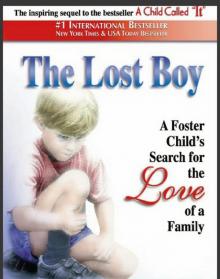 The Lost Boy
The Lost Boy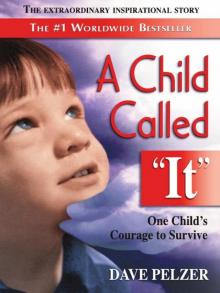 A Child Called It
A Child Called It